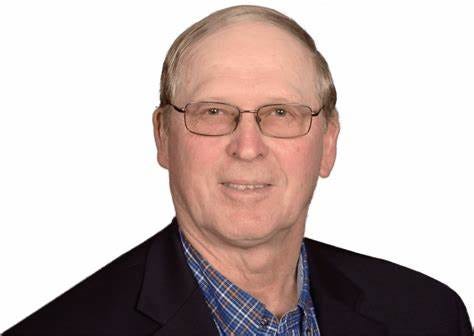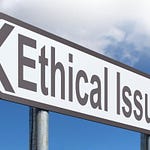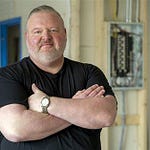“Right now there is a lot of uncertainty out there with the cuts. I believe 60% of the state budget in SD come from Federal funds. And with the Federal funds being cut there is a lot of uncertainty what we are going to have to deal with the next session.” - Richard Vasgaard
HCR 6013 -Supporting the Electoral College, denouncing the National Popular Vote Interstate Compact, and inviting interested states to form the Electoral College Interstate Compact.
Transcript:
Dave Roetman: This is the Making Waves podcast. My name is Dave Roetman. We're here with Richard Vasgaard, District 16 representative.
Welcome, Richard.
Richard Vasgaard: Glad to be here. Appreciate the opportunity.
I'm a farmer. Lived in just north of Centerville all my life. Our farm has been in the family for 125 years, so we've been around a while and agriculture is very important to me.
I also have a degree from SDSU in plant science or agronomy.
Dave Roetman: Salt of the earth.
Richard Vasgaard: We try to be.
Dave Roetman: One of your major issues is the carbon capture pipeline.
Richard Vasgaard: Correct.
Dave Roetman: What is your position on it? Give some background.
Richard Vasgaard: As a farmer, it has grave concerns to me because, again, my degree is in agronomy and CO2 is an essential for everything we grow. And there's plenty of information out there that show greenhouses actually pump CO2 into the greenhouse to raise the levels. I've talked to people who produce hybrid seed corn and they know plants from one end to the other.
And when I asked them, what do you think about CO2 levels? And they say, we need higher levels, not lower levels.
Dave Roetman I've heard that we're in a carbon dioxide dearth.
Richard Vasgaard: Yes.
So that has grave concerns to me. And I know everybody's out there, well, we need economic development in South Dakota. Well, that's great, but we need good economic development and we can't have it for the short term.
I was at the groundbreaking of GEVO back in 21, I believe, and I've been asking questions about this ever since. I asked them, as a farmer, should I be concerned about what it's going to do to my yields, reducing CO2? And their comment was, well, we hadn't thought about that.
Dave Roetman: They don't care about that.
Richard Vasgaard: No, they're focused on the dollar signs. And to me, it's a short term gain. And if we do cause problems down the road and it causes problems, and it's not only us as farmers, it's people that grow the gardens, that have flowers, the trees, everything that's green requires CO2.
So what's going to happen if it causes a problem? There is no plan B.
Dave Roetman CO2 is plant food.
Richard Vasgaard: Yes. And are we going to end up going back to the taxpayers and say, well, gee, we got to subsidize the farmers now because we've caused some issues with what they grow.
There's a lot of things out there that I sent a bunch of information into the PUC, I think 18 pages of stuff that I'd found regarding things like this. It's a hazardous material. I think that that's something
Dave Roetman : under that pressure, under that temperature…
Richard Vasgaard: And the amazing thing to me is a year ago at the PUC when they were testifying, they didn't want to release the plume studies because of terrorism. And I can understand that. But if you look at pictures of their pipelines, every so often they have to have it come above the ground where the valves are.
There's nothing but a chain link fence around it. Somebody wanted to drive a big truck through that. It caused a lot of problems.
So is terrorism really the issue? Or just they don't want the public to know what the plume studies say? That's an assumption on my part.
Dave Roetman But I'm guessing that the terrorists already have that information anyway.
Richard Vasgaard: And you're probably correct on that. Yes. And we saw what happened in Mississippi when the rupture took place down there. It happened to be in a less dense area, but this is what they used to euthanize birds when they have bird flu or a pig barn that has a pig disease.
They pump it full of CO2 and it's very effective at what it does. And I think that's a grave concern.
Dave Roetman What other issues surround the CO2 pipeline? The cost, the subsidies?
Richard Vasgaard: The big thing was the cost.
You look at the millions of dollars that we are going to invest in this thing.
Dave Roetman: Billions.
Richard Vasgaard: And I get the tax credit thing.
That's how ethanol got started. But the big difference is ethanol produced revenue. They sold products.
This does absolutely nothing but pump it down into the ground. And I read about this winter there was an article about the airline industry and of course they want the green fuel, but they're starting to realize that this new green fuel is going to cost two to three times more than what they're paying now. So they're talking to the government about subsidies to help them.
So what's the total cost of this thing to the taxpayer going to be? Nobody knows.
Dave Roetman Funny how that works. Just one subsidy leads to a chain of more subsidies and everybody's getting money from the taxpayer rather than producing stuff for the market.
Richard Vasgaard: And the interesting thing to me is that we could increase our corn demand by raising ethanol use from 15 to 20 percent. And they've been doing it in Watertown for years. A lot of times I burn 30 percent and whenever I can find it I put it in my vehicles.
If we could bump the ethanol use, the infrastructure's there. It's not going to cost anything. It would increase the demand.
The ethanol plants would be busy. Very simple solution. And the same EPA controls that and they're part of this pipeline deal too.
Dave Roetman: Tell us about some of the legislation you worked on or brought this legislative session.
Richard Vasgaard: One of the big pieces that caused a lot of debate in the legislature was the library bill. Everybody in the legislature understands that we have materials in our public libraries that probably shouldn't be there.
And the big question is how do you deal with that? The bill that was brought forth, in my opinion, didn't take any books out of the library and it put our librarians in a bad position. The legal people that I've talked to said nobody, no judge in South Dakota is ever going to send the librarian to jail or prison. But the fact is, you know as well as I do, that we have a highly charged political atmosphere.
And if a librarian disciplined a child or said something, this would be a very easy tool for the parents to get back at that person and accuse them of sending an inappropriate book home. And even though they won't go to prison, they're going to be all over social media. They're going to be in the news.
And I talked to my local librarian and said she'd resign because she didn't want to be put in that position. And to me that didn't resolve anything. So I've met with several of the librarians during library week.
I was invited up to the library and she showed me there were two websites that you can go to that recommend books and ages and stuff. And she typed in a title and an author on one website and it said good for 9th through 12th. So high school kids, it's acceptable.
She went to the other website, same title, same author. It says for adults only. So there's a variation in what's acceptable and what isn't.
And as I've talked to the librarians, it seems like they always ask the question, well where are the guidelines? What do we go by? Is there a list? And to me that seems like that is a better solution than try to criminalize them or put them in a difficult position where they're embarrassed by some parents that are trying to get back at them. So I think we got librarians working. We got the discussion started and we got librarians working on it.
We need to move forward with that and come up with some guidelines. I've worked with people my entire life and if somebody does something wrong, I don't go out there and tell them, well you've got to do your job. You go out there and figure out, well where did our miscommunication come into? What is it we aren't understanding? So we both get on the same page and I think that that's a better resolution to this problem than bringing a bill that was presented in the legislature this year.
Dave Roetman: I've been there myself. Miscommunication is a big cause of conflict.
Richard Vasgaard: It is, it is.
Dave Roetman What other bills have you brought this legislative session?
Richard Vasgaard: I brought a bill regarding the electoral college. There's a number of states out there that are trying to band together and form groups to promote the popular vote amongst the states. This bill that I brought would maintain the electoral college.
We got it passed through the legislature. We've sent that information to surrounding states. North Dakota has already called the Mr. Leader about it and so that we can join together.
I think our constitutional, our constitution upholds it. I believe, as I went through the information, there were only five times in the history of this country where the electoral college has had to kick in and elect the president. The rest of the time it's worked the way it should, but the intent of that is so that the populous states don't override us in the midwest where we're less popular, populated, excuse me.
And I think as I look at it, there's good reasons for them to do that and in support of it and our legislature's in support of it. I think we need to move down that, move that direction.
Dave Roetman: Just for clarity, what you're talking about is a bill that would preserve the electoral college.
Richard Vasgaard: Correct.
Dave Roetman Yes, I completely agree with that. Could you imagine what would happen if it was popular vote only? They just manufacture ballots in LA County.
Richard Vasgaard: Yeah, the midwest wouldn't matter.
Dave Roetman Yeah, I know. They just say, oh there's 800,000 people in South Dakota. We're just going to manufacture those in LA County, California. That's it.
Richard Vasgaard: And I think there's 19 states that currently have signed on with that pact for the popular vote.
Dave Roetman : Okay, where's that bill now? Has it been signed? Did it pass?
Richard Vasgaard: Yes, it's been signed by the governor. Awesome. Yes.
Dave Roetman Thank you. That's awesome.
Richard Vasgaard: Now we've got to get some other states working with us and try to keep the support of the electoral college.
Dave Roetman Good. Thank you for doing that. I appreciate it.
Richard Vasgaard: What other bills have you passed or worked on? I worked on another bill regarding CO2 pipeline safety. The FASMA, Pipeline Materials and Hazardous... it's a governmental agency that oversees pipelines. And after the break in Mississippi, or the rupture in Mississippi, they decided that maybe they needed to have a different set of rules for CO2 pipelines versus the other ones.
So they went through a process, came up with a new set of rules, but it wasn't adopted yet. So my bill was to hold off on putting any pipeline on the ground until the new rules were established.
Dave Roetman : Good idea.
Richard Vasgaard: But now that Trump is in effect, he's cancelled all those rules. So they're maybe redoing it or where they're at, I don't know. But I got it through the House, but I couldn't get it through the Senate committee.
So I thought that was rather important. Safety is a key issue.
Dave Roetman That would apply only to South Dakota. Would it affect federal stuff?
Ruchard Vasgaard: No, that'd just be South Dakota. You know, I have a friend of mine that's worked on high tensile, high voltage lines, traveled all over the country, pipelines and stuff. And when I talked to him about it, he says that pipeline should be six feet deep, just because of the material it's handling.
So he's somebody that's worked with lines and stuff, so I trust his judgment. And again, I think our job as a legislature is to look out for the safety of the people and the population of South Dakota. You can't go back and do it over again if you have a problem.
We need to do it right the first time.
Dave Roetman : What do you expect is going to happen next legislative session?
Richard Vasgaard: Right now there's a lot of uncertainty out there with the cuts. I believe that 60% of the state budget in South Dakota comes from federal funds.
And with the federal funds being cut, there's a lot of uncertainty what we're going to have to deal with the next session. One of the things that we discovered this last session, former Governor Noem took some big cuts to public broadcasting and libraries. And that was probably one of the biggest issues that I received emails on, is people wanted those restored.
And so we're able to get them restored, but along the way, we also found some efficiencies. So we reduced, I think the libraries, we were able to reduce their budget by $800,000. And I don't remember what the number was in public broadcasting.
So there's some areas out there that we need to work on, on state government. I'm not sure if there's anybody that has a handle on all of the departments and where we're at. We've seen it with the indictments of some employees already.
Transparency and understand where our dollars are being spent in South Dakota is going to be huge, especially if we see decreases in federal funding. It's kind of disappointing as a legislature. I attend a lot of meetings and everybody's talking about our taxes are too high.
Our taxes are too high. But two years ago, the voters of South Dakota voted in the Medicaid expansion. It cost our state budget $51 million this year.
And that...
Dave Roetman It's going to increase.
Richard Vasgaard: And it's going to increase. And that affects everything else.
So it... They want us no more taxes, and then they vote to bring something. You kind of sit there scratching your head.
Dave Roetman Entitlement that's going to increase over time.
Richard Vasgaard: Exactly. Wondering where this thing's going to head. But yeah, I think next year's budget's going to be a real challenge for us.
And there may be have to be some cuts to some programs across South Dakota. And we're required to constitutionally balance our budget. And that's what we're going to have to do and work with what we have.
Dave Roetman Final thoughts?
Richard Vasgaard: Um, it's good. You know, I served in the legislature 2020-21. I sat out for two years and was able to get back in.
The process in the legislation is the part I enjoy the most. The politics, not so much.
Dave Roetman : I'm with you.
Richard Vasgaard: And the people... The people I get to work with is fantastic, though. I know people from all over the state and friends with many of them. And that's the great thing about being in South Dakota legislature.
Dave Roetman Wonderful. Richard, thank you very much for being with us.
Richard Vasgaard: Appreciate it.
Dave Roetman This has been the Making Waves podcast. My name is Dave Roetman. We've been here with Richard Vasgaard, District 16 House.













Share this post